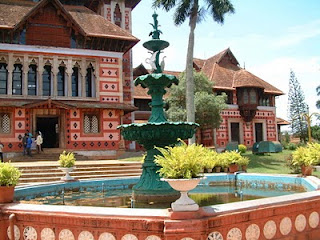Napier Museum and Art GalleryThiruvananthapuram, Kerala
History
Napier Museum and Art Gallery is a part of the Napier Museum campus,
which is situated in the middle of Trivandrum (Thiruvananthapuram),
Kerala. One should at not miss the tour of this museum, to get a feel of
the authentic cultural heritage of ‘The God's Own Country’. Named after
the former Governor General of Madras, Sir John Napier, the Napier
Museum was constructed in the 19th century. The museum was constructed
in the Indo-Saracenic style. The Napier museum is an abode of a number
of different exotic and rare assortments of archaeological and historic
relics, ancient ornaments, bronze idols, ivory carvings. One can also
find a chariot, which has been designed beautifully with a number of
tribal arts.
Napier Museum & Art Gallery also boasts of maintaining an
ergonomically designed naturally cooled compound, which is designed
according to the principles of physics and architecture. Hence, it saves
a lot of fuel and electricity. The use of plastic has been banned
inside the premises of the museum, which is another thing that makes the
Museum premises eco-friendly. The Napier Museum complex stores a number
of artifacts, which exemplify the prosperous cultural heritage of
Kerala. The museum itself is a wonderful piece of architecture, with its
picturesque green surroundings.
Napier Museum is popularly known as the Government Art Museum. It will
be quite interesting to note that the museum’s building is a rare
amalgamation of the Kerala, Mughal, Chinese and Italian architectural
styles. The Sree Chitra Art Gallery inside the Napier museum features a
rare collection of paintings by Raja Ravi Varma, Roerich and some
fascinating works from the Rajput, Mughal and Tanjore schools of
painting. The museum is also home to an exotic collection of paintings
that are native to Japan, China, Bali and Tibet. This collection offers a
visual treat and acknowledges the art and culture of these countries.
The Museum holds some of the artifacts that clearly exhibit the cultural
harmony between Indian and other cultures. These exhibits are the
evidence of relation between India and the neighboring countries like
China.










No comments:
Post a Comment